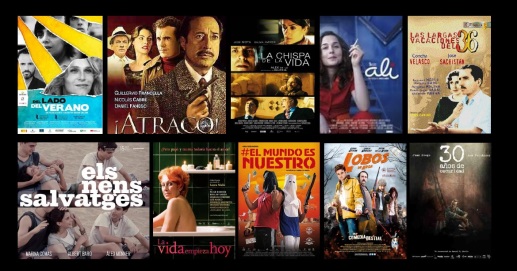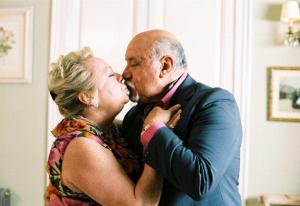Saturday 9th March – 18.00
Del lado del verano– Dir Antonia San Juan (2012)
Starring – Antonia San Juan, Eduardo Casanova, Secun de la Rosa and Sara Guerra.
 My first ¡Viva! film of the festival couldn’t have been a better choice to lift me from post-visit-to-Spain-blues and let’s face it, who could resist a film starring and directed by the actress who played Agrado in Almodóvar’s Todo sobre mi madre?
My first ¡Viva! film of the festival couldn’t have been a better choice to lift me from post-visit-to-Spain-blues and let’s face it, who could resist a film starring and directed by the actress who played Agrado in Almodóvar’s Todo sobre mi madre?
The film is set in the Canary Islands and is a sensitive comedy about the sort of dysfunctional family that Spanish cinema does so well.
Antonia doesn’t disappoint yet there are also some fabulous performances from the other protagonists. I particularly loved the bingo hall scenes and watch out for a hilarious cemetery scene!
Sunday 10th March – 20.40
¡Atraco! – Dir Eduard Cortés (2012)
Starring – Óscar Jaenada, Amaia Salamanca, Guillermo Francella, Nicolás Cabré, Daniel Fanego.
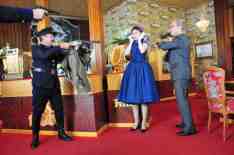 Something totally different but equally as enjoyable and entertaining. I loved this film for the attention to detail in re-creating Madrid of the 1950s. The film is inspired by a jewellery shop robbery and focuses on attempts to rescue the late Evita’s jewels which have been pawned and have attracted the attention of General Franco’s wife, Carmen Polo.
Something totally different but equally as enjoyable and entertaining. I loved this film for the attention to detail in re-creating Madrid of the 1950s. The film is inspired by a jewellery shop robbery and focuses on attempts to rescue the late Evita’s jewels which have been pawned and have attracted the attention of General Franco’s wife, Carmen Polo.
Fast-paced and tense, you’ll love this tragi-comedy!
Friday 15th March – 20.20
La chispa de la vida– Dir Álex de la Iglesia (2011)
Starring – José Mota, Salma Hayek, Blanca Portillo.
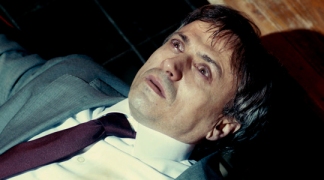 I made a point of not reading much about this Álex de la Iglesia offering before I went to see it. If there is any director guaranteed to shock and surprise, this is the one and so I wanted to ensure that the shock value wouldn’t be spoilt by reading reviews and plot synopses before I was treated to this film on the big screen. Whilst I’m talking about the shock factor in his films – if you haven’t already, you have to see Balada triste de trompeta (2010), featured at last year’s festival and including my current favourite line in a film “I bit Franco!”
I made a point of not reading much about this Álex de la Iglesia offering before I went to see it. If there is any director guaranteed to shock and surprise, this is the one and so I wanted to ensure that the shock value wouldn’t be spoilt by reading reviews and plot synopses before I was treated to this film on the big screen. Whilst I’m talking about the shock factor in his films – if you haven’t already, you have to see Balada triste de trompeta (2010), featured at last year’s festival and including my current favourite line in a film “I bit Franco!”
Back to La chispa de la vida, this is a satirical film, which highlights the topical issue of the financial crisis. The film featuresan out of work publicist who invented the Coca-Cola strap-line “Coca-Cola – la chispa de la vida…” When he finds himself at death’s door, impaled on a monument in Cartagena, he agrees to a primetime interview as a way of securing the financial future of his family.
This is like no other film I have ever seen – but this is something that I say after every product of the cult director Álex de la Iglesia … see it!
Saturday 16th March – 15.40
La voz dormida – Dir Benito Zambrano (2011)
Starring – Inma Cuesta, Maria León, Marc Clotet, Daniel Holguin.
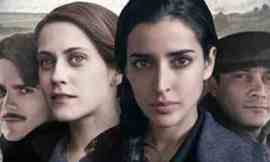 Some people think that Spanish directors should move away from Civil War themes but I don’t agree. I think the Spanish Civil War was the most significant event of the last century and the atrocities and horrors should still be highlighted on screen to educate future generations and to honour those who fell.
Some people think that Spanish directors should move away from Civil War themes but I don’t agree. I think the Spanish Civil War was the most significant event of the last century and the atrocities and horrors should still be highlighted on screen to educate future generations and to honour those who fell.
La voz dormida does exactly that and more specifically, it pays homage to the women of the Civil War who were held in prisons, interrogated, tortured and shot. Based on the novel by Dulce Chacón, the film starts Inma Cuesta (Primos) as Hortensia, a pregnant Republican held in the Ventas prison in Madrid. Her younger sister Pepita played by Goya winner Maria León, attempts to prevent her from falling at the hands of the firing squads.
This is an original take on the Civil War drama in that it focuses on the women of the war and is worth seeing if only for the outstanding performances by Cuesta and León.
Saturday 16th March – 18.15
Ali– Dir Paco R. Baños (2012)
Starring – Verónica Forqué, Nadia de Santiago, Julián Villagrán.
 This was my first film followed by Q&A of the festival and I thoroughly enjoyed it. Set in a colourful Seville, the coming-of-age film is as attractive to watch as it is sensitive in its treatment of the relationship between teenager Ali and her Mum – who suffers from mental health issues.
This was my first film followed by Q&A of the festival and I thoroughly enjoyed it. Set in a colourful Seville, the coming-of-age film is as attractive to watch as it is sensitive in its treatment of the relationship between teenager Ali and her Mum – who suffers from mental health issues.
It is worth seeing by anybody who appreciates how life experiences can cause people to build a wall around themselves and push away those that love them and might just be the right people to help them through such painful experiences.
Sunday 17th March – 12.00
Las largas vacaciones del 36– Dir Jaime Camino (1976)
Starring – Concha Velasco, José Sacristán, Francisco Rabal, Ángela Molina.
I started my annual marathon ¡Viva! Sunday with this matinée classic from late Franco era Spain. This film highlights the effect that the Civil War had on middle-class families spending their summer holidays in a destination for bourgeois Barcelonans.
I liked how the characters in this rural summer holiday setting became a representation of the wider political situation in the rest of Spain and how the reactions of the children to events both reflected and contrasted those of their elders.
Sunday 17th March – 14.20
Els nens saltvatges– Dir Patricia Ferreira (2012)
Starring – Marina Comas, Àlex Monner, Albert Baró.
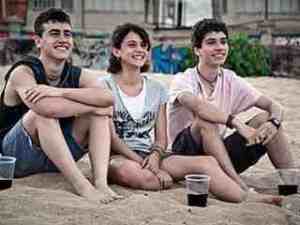 This was my second director Q&A of the festival and Patricia Ferreira set the film up perfectly in her introduction by saying little more than that we were about to see a film that was inspired by a real event that was so shocking that it had to be represented on film. In Catalan and Castillian, the film tells the tale of teenage rebellion and the lives of Alex, Gabi and Oki from their three viewpoints. Snippets of police interviews and flashbacks point to the fact that something terrible has happened but the viewer doesn’t know what exactly until right at the end of the film.
This was my second director Q&A of the festival and Patricia Ferreira set the film up perfectly in her introduction by saying little more than that we were about to see a film that was inspired by a real event that was so shocking that it had to be represented on film. In Catalan and Castillian, the film tells the tale of teenage rebellion and the lives of Alex, Gabi and Oki from their three viewpoints. Snippets of police interviews and flashbacks point to the fact that something terrible has happened but the viewer doesn’t know what exactly until right at the end of the film.
The film is therefore tense and gripping throughout and it totally proves right the saying “it’s always the quiet ones”!
Sunday 17th March – 18.10
La vida empieza hoy– Dir Laura Mañá (2010)
Starring – Pilar Bardem, María Barranco, Sonsoles Benedicto, Eduardo Blanco, Mariana Cordero.
Slightly achy-legged but happy, I completed my ¡Viva! viewing of the day with a comedy about sex lives in the twilight years. The action centres around a group of retired men and women attending sex classes in a local community centre. La vida empieza hoy features the most dramatic change of image make-over in cinema history and a fantastic performance by Pilar Bardem – mum of the legend that is Javier!
The film is hilarious (some great one-liners and cringe-worthy sex scenes) as it is tear-provoking and was a perfect way to end a perfect ¡Viva! Sunday.
Monday 18th March – 18.25
El mundo es nuestro– Dir Alfonso Sánchez (2012)
Starring – Alfonso Sánchez, Alberto López, Pepe Rodriguez, Antonia Gómez, Maria Cabrera, Alfonso Valenzuela.
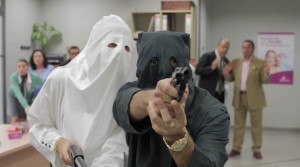 One of my favourite ¡Viva! days by far! This film screening followed a fab (as ever) talk by Carmen Herrero of Manchester Metropolitan University entitled Indignados, crisis and film: New directions in Spanish cinema and Screen 1 was packed and buzzing!
One of my favourite ¡Viva! days by far! This film screening followed a fab (as ever) talk by Carmen Herrero of Manchester Metropolitan University entitled Indignados, crisis and film: New directions in Spanish cinema and Screen 1 was packed and buzzing!
The film was also followed by a Q&A with Alfonso Sánchez and Alberto López. El mundo es nuestro is a comedy which highlights the dire economic situation in Spain and in particular Andalucía and also the craziness that characterizes (meant affectionately) Seville during Semana Santa. Two men from Seville attempt to rob a bank, choosing the garb of holy-week penitents as disguises. Things do not exactly go to plan…
I LOVED this film! I LOVED the entertaining Q&A session after. Alfonso and Alberto were funny and interesting and I am determined so spread the good word about this film to as many people as possible after hearing how difficult it has been for them to get support for their film due to the topic it treats. Watch it! Buy it! Share it! ¡Por favor!
Friday 22nd March – 20.40
Lobos de Arga– Dir Juan Martinez Moreno (2011)
Starring – Gorka Otxoa, Carlos Areces, Secun de la Rosa
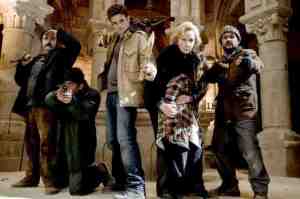 After a few days off, I was back at the fest, joined by my partner-in-blog Esther. We saw Lobos de Arga after a Cornerhouse pizza – somewhat a tradition of ours and if I’m honest, a little too much wine. Lobos de Arga is an amusing parody of the werewolf horror genre. Tomás, the protagonist is a writer who returns to his home village of Arga in Galicia and finds himself charged with the task of breaking an ancient curse in order to save the people of Arga from a pack of werewolves!
After a few days off, I was back at the fest, joined by my partner-in-blog Esther. We saw Lobos de Arga after a Cornerhouse pizza – somewhat a tradition of ours and if I’m honest, a little too much wine. Lobos de Arga is an amusing parody of the werewolf horror genre. Tomás, the protagonist is a writer who returns to his home village of Arga in Galicia and finds himself charged with the task of breaking an ancient curse in order to save the people of Arga from a pack of werewolves!
It wasn’t the best film of the festival but a light-hearted and entertaining way to spend a Friday night!
Saturday 23rd March – 16.00
30 años de oscuridad– Dir Manuel H. Martín (2011)
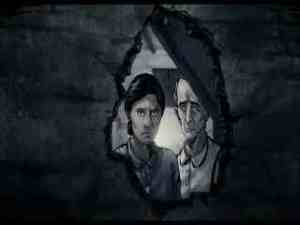 This was a marvellous way to end my festival experience 2013. 30 años de oscuridad is an unforgettable documentary which taught me a lot about Spain’s “moles” – the people who saved themselves by hiding in cellars, attics and even behind the walls of their own houses during the Spanish Civil War and the Franco regime.
This was a marvellous way to end my festival experience 2013. 30 años de oscuridad is an unforgettable documentary which taught me a lot about Spain’s “moles” – the people who saved themselves by hiding in cellars, attics and even behind the walls of their own houses during the Spanish Civil War and the Franco regime.
I loved the mixture of historical footage, interviews and animation used to create an unforgettable documentary that I would recommend to anyone interested in this period of history.
And that was it for this year! All that was left was to enjoy the sangría and cerveza at the Fiesta Clausura and look forward to next year’s event.
Special thanks to Jessie Gibbs for putting the fab programme together… The best yet!
are it!
Y ¡hola! Jason Isaacs
LB
